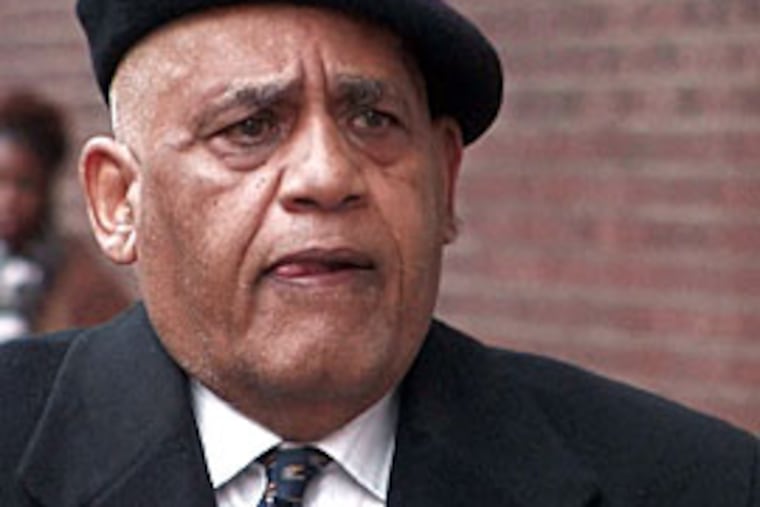Street's position on taxes rejected often by courts
In arguing that federal income taxes are unconstitutional, T. Milton Street Sr. is far from alone - but when it comes to the law, he has gone way out on a very weak limb.

In arguing that federal income taxes are unconstitutional, T. Milton Street Sr. is far from alone - but when it comes to the law, he has gone way out on a very weak limb.
Time and time again, courts have ruled that while it is perfectly legal to believe that income taxes are unconstitutional, that is no defense for not paying them.
The latest high-profile court case in which this was an argument involved the actor Wesley Snipes.
On Feb. 1, a federal jury in Florida convicted the movie star of failing to file tax returns, but acquitted him of more serious felony charges of conspiracy and tax fraud.
Snipes, 45, must repay millions in back taxes and penalties, and he faces up to three years in prison when he is sentenced in April. Two of Snipes' codefendants - a tax protest leader and an accountant - were convicted of tax fraud and conspiracy and each faces up to 10 years in prison.
Snipes' views may have been inspired by his association with the Nuwaubians, a quasi-religious African American sect that promotes antigovernment theories.
The Constitution has allowed the government to collect taxes from the nation's early days, but it was not until the passage of the 16th Amendment in 1913 that the present federal income tax came into existence.
Protesters come in two varieties.
The first, known as resisters, recognize the government's right to collect income tax, but withhold payment on moral grounds, such as opposition to war or other government actions.
The second, to which Street claims to be an adherent, questions the legal foundation of income tax. The former Pennsylvania state senator is now on trial in federal court on charges of wire and mail fraud and tax offenses, including not filing returns and failing to pay income tax on more than $2 million in income.
Besides claiming that the 16th Amendment is unconstitutional or was improperly ratified, tax foes have argued that wages are not income, that gold is the only money, and that filing tax returns violates the privilege against self-incrimination.
In his own tax case, Street, the older brother of former Mayor John F. Street, on Thursday cited the "missing OMB control number."
Basically, this discredited theory holds that because some IRS forms and instruction booklets do not carry a control number from the federal Office of Management and Budget as required by the Paperwork Reduction Act, a citizen may ignore the rule that requires filing a federal tax return.
Daniel B. Evans, a trust and estate lawyer in Philadelphia, has called these protesters "tax deniers."
"Just like Holocaust deniers attempt to rationalize and justify their refusal to accept an indisputable historical fact . . . tax deniers attempt to rationalize and justify their refusal to accept indisputable historical facts," Evans writes on a Web page he has maintained on the subject since the 1990s.
"These people don't say, 'I'm protesting the tax laws.' They're saying. 'They just don't apply to me,' " he said yesterday.
The courts have called these positions frivolous, and in 1991 the U.S. Supreme Court ruled that a "belief that the federal income tax is unconstitutional . . . is not a defense to a charge of 'willfulness,' even if that belief is genuine and is held in good faith."
J.J. MacNab, a Bethesda, Md., insurance analyst who tracks tax deniers and has testified before Congress about them, said a "rough estimate" based on IRS figures would put their number about 500,000 nationwide.
She said they were a much smaller group, but the Internet helped swell their ranks.
Neither Snipes nor Street fits the profile.
"Primarily, they are white, they are over 50, and they have military experience," she said. "They tend to be right-wing and they tend to be very angry at the government."
But she said the belief is making inroads within the African American community and noted that on Thursday, Sherry Peel Jackson, a black former IRS agent turned tax denier, was sentenced in an Atlanta federal court to 48 months in prison for not paying her taxes.
MacNab said that when she heard that Street had claimed income taxes were unconstitutional, she wondered if he was inspired by Snipes' acquittal on the more serious charges against him.
But after hearing a tape of Street's testimony, she thought differently.
"He really knew the terminology, he really knew the words to say," MacNab said. "They were practiced. It was the 'Show me the law.' This is the stuff I hear hundreds of times a year. He actually rang true."
Street's trial resumes Tuesday.